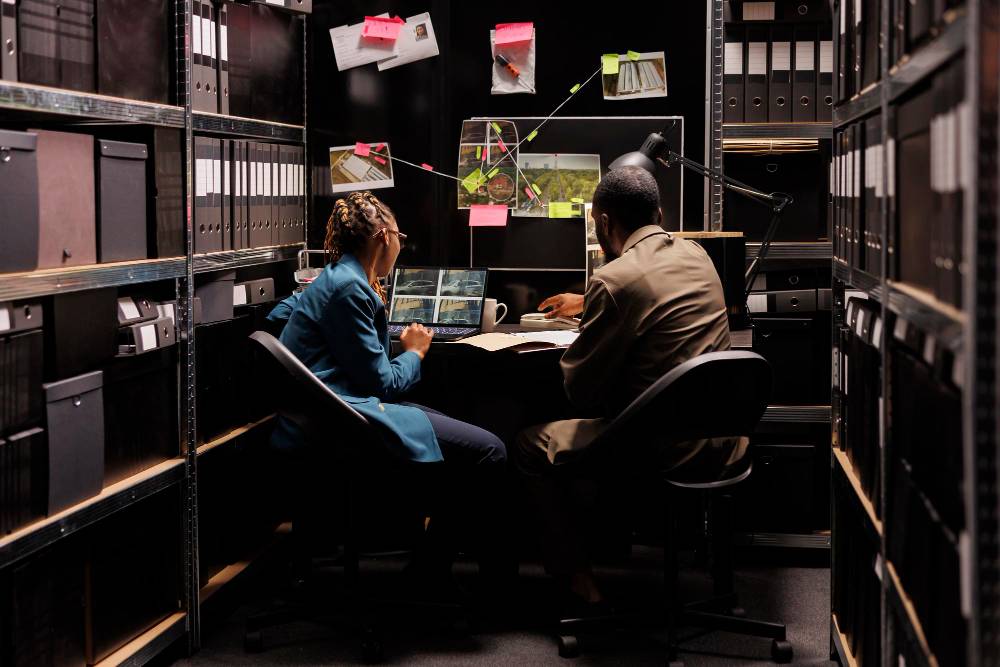Minutes
Free Consultation
Call Us Now!
404-876-7273Minutes
Call Us Now!
404-876-7273
Have you ever found yourself questioning the efficiency of traditional police investigations or wondering if there’s a more personalized approach to uncovering the truth? If you need answers quickly but feel bogged down by bureaucratic red tape, then frustration can mount, and your need for resolution will grow stronger. Thankfully, private investigations offer an alternative that might be just what you need. At the Global Bureau of Security & Investigation, we provide reliable services for local clients. Continue reading to find out about the key differences between private and police investigations so you can determine which might be best for your unique situation.
Private investigations and police investigations differ fundamentally in their nature and objectives. Police investigations are typically reactive and initiated after a crime has been reported. Their primary aim is to uphold public safety, gather evidence for criminal proceedings, and ensure justice is served. These investigations are bound by strict protocols and legal requirements designed to maintain the integrity of the judicial process. In contrast, private investigations are often proactive and geared toward the needs of the client. Private investigators in Sandy Springs can provide services for locating missing persons, conducting background checks, uncovering infidelity, and performing corporate due diligence. While PIs do adhere to legal standards, they have more flexibility in their methods, allowing them to operate in a more customized manner.
Police officers retain the legal authority to arrest suspects, execute search warrants, and carry firearms. They operate under the auspices of governmental law enforcement agencies, giving them access to a wide range of resources and databases that are typically not available to the general public or private entities. Private investigators do not have the same level of authority. They cannot arrest individuals or execute search warrants. However, they do have the ability to gather information through surveillance, interviews, and public records. PIs must operate within the confines of the law, often requiring them to be licensed and bonded, depending on the jurisdiction. This distinction in authority means that while police can enforce the law, PIs focus on collecting information and evidence that can aid in a variety of situations, from personal matters to complex corporate issues.
When it comes to resources, police investigations benefit from substantial support from government agencies. Police departments have access to forensic laboratories, advanced technology, and comprehensive databases, which allow for thorough and efficient investigations. Their operations are funded by taxpayers, ensuring a steady flow of resources to tackle a wide array of criminal activities. Private investigators, although often highly skilled, operate with fewer resources. They rely on their expertise, experience, and a network of contacts to gather information. PIs often use surveillance equipment, public records, and online databases to conduct their investigations. While they may not have access to the same level of forensic technology as the police, private investigators often compensate with creativity and determination, finding ways to obtain critical information that might elude traditional law enforcement.
Police investigations culminate in official reports that are subject to public record laws and can be used in court proceedings. Police officers are accountable to their departments, the legal system, and the public. Their actions are subject to oversight by internal affairs divisions, independent review boards, and, in some cases, public scrutiny. Private investigators, while also accountable, operate under different guidelines. They provide detailed reports to their clients, summarizing their findings and the methods used to obtain information. These reports are usually confidential and customized to the client's needs. PIs must maintain high ethical standards, as their reputation and ability to operate legally depend on their adherence to laws and professional codes of conduct. This accountability is enforced through licensing bodies and professional associations that set and uphold standards for the industry.
Whether you need the authoritative power of the police or the specialized focus of a private investigator, understanding the differences between these two approaches is important. At the Global Bureau of Security & Investigations, we offer personalized, discreet, and effective services to meet your unique needs. If you’re in need of professional investigative services, contact us today.
Read what our happy clients say about our professional and trusted security services.